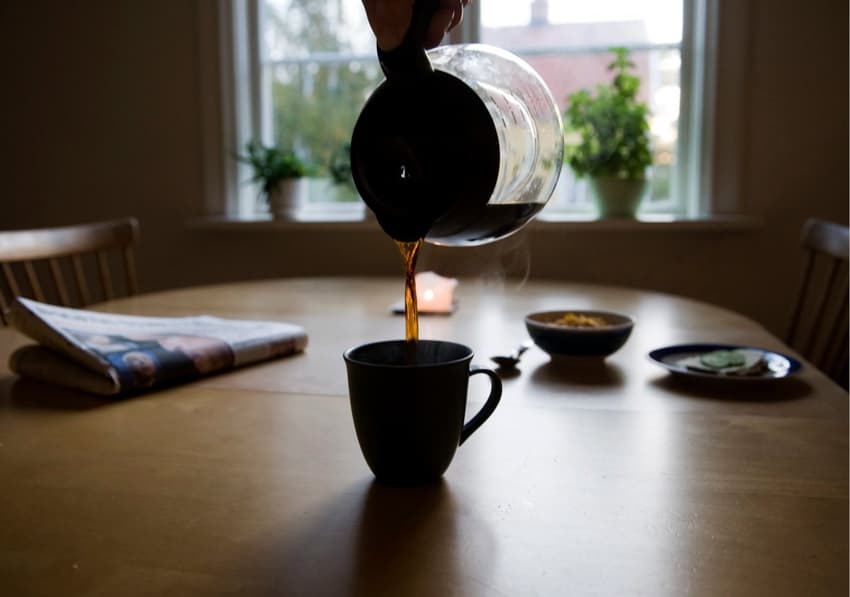Why Sweden used to stockpile coffee in case of crisis

It's no secret that Swedes love their caffeine. They drink more coffee than almost any other nationality and have a booming cafe industry. But did you know there used to be secret stockpiles of the stuff?
Believe it or not, up until the 1990s, Swedes went as far as stockpiling coffee in huge warehouses, so that even in the event of an unforeseen crisis, no person in Sweden would need to forego fika.
Even though the country hadn't been at war for over 200 years, authorities did their best to ensure that processes are in place to help things run smoothly in the event of an emergency, whether war or a natural disaster.
And experience from the Second World War, when rations were imposed on many foodstuffs including coffee, showed that keeping the population caffeinated would be a good starting point if the government wanted to keep morale high.
Coffee rationing began in 1940, the first to be introduced, and stayed in place longer than any other food ration in Sweden, until 1951. So up until the 1990s, around 200 food warehouses for times of crisis stored long-lasting foodstuffs such as beans, pulses, rice and sugar.
One warehouse in Lenhovda, Småland, housed 330 tonnes of coffee – enough to brew 100 million cups, should the need arise. It was shut down in 2001, along with most similar storage spots, after the Cold War ended.
These days, the food stored in supermarket warehouses should be sufficient to sustain the country for between one and two weeks. That's quite a difference from neighbouring Finland, where enough food is stockpiled to keep people going for several months.
But after increasing concern about a future risk of war, this could be changing. An inquiry submitted to the government in February 2024 proposed rebuilding Sweden’s food stores so that essential foods like bread, pasta and oatmeal could be produced at short notice.
Historically, Sweden has had a troubled relationship with coffee, which at several points in history was banned due to fears of its impact on health.
In fact, in the 18th century some economists argued that the drink was even harmful to the economy, and indulging was "immorally wasteful". Naturally, the population didn't take this lying down, but continued to risk prison sentences by drinking the warming beverage.
Coffee may be no longer officially stockpiled, but it is one of the items that the Swedish Civil Contingencies Agency (MSB) advises individuals to keep as part of their own emergency preparedness kits.
Sweden isn't the only country that took such measures. Switzerland also stockpiled coffee for decades until the practice was abolished only in 2019, after the government decreed the beverage was "not essential for human life".
We'll agree to disagree on that point.
This article was originally published as part of The Local's Advent Calendar series in 2019.
Comments
See Also
Believe it or not, up until the 1990s, Swedes went as far as stockpiling coffee in huge warehouses, so that even in the event of an unforeseen crisis, no person in Sweden would need to forego fika.
Even though the country hadn't been at war for over 200 years, authorities did their best to ensure that processes are in place to help things run smoothly in the event of an emergency, whether war or a natural disaster.
And experience from the Second World War, when rations were imposed on many foodstuffs including coffee, showed that keeping the population caffeinated would be a good starting point if the government wanted to keep morale high.
Coffee rationing began in 1940, the first to be introduced, and stayed in place longer than any other food ration in Sweden, until 1951. So up until the 1990s, around 200 food warehouses for times of crisis stored long-lasting foodstuffs such as beans, pulses, rice and sugar.
One warehouse in Lenhovda, Småland, housed 330 tonnes of coffee – enough to brew 100 million cups, should the need arise. It was shut down in 2001, along with most similar storage spots, after the Cold War ended.
These days, the food stored in supermarket warehouses should be sufficient to sustain the country for between one and two weeks. That's quite a difference from neighbouring Finland, where enough food is stockpiled to keep people going for several months.
But after increasing concern about a future risk of war, this could be changing. An inquiry submitted to the government in February 2024 proposed rebuilding Sweden’s food stores so that essential foods like bread, pasta and oatmeal could be produced at short notice.
Historically, Sweden has had a troubled relationship with coffee, which at several points in history was banned due to fears of its impact on health.
In fact, in the 18th century some economists argued that the drink was even harmful to the economy, and indulging was "immorally wasteful". Naturally, the population didn't take this lying down, but continued to risk prison sentences by drinking the warming beverage.
Coffee may be no longer officially stockpiled, but it is one of the items that the Swedish Civil Contingencies Agency (MSB) advises individuals to keep as part of their own emergency preparedness kits.
Sweden isn't the only country that took such measures. Switzerland also stockpiled coffee for decades until the practice was abolished only in 2019, after the government decreed the beverage was "not essential for human life".
We'll agree to disagree on that point.
This article was originally published as part of The Local's Advent Calendar series in 2019.
Join the conversation in our comments section below. Share your own views and experience and if you have a question or suggestion for our journalists then email us at [email protected].
Please keep comments civil, constructive and on topic – and make sure to read our terms of use before getting involved.
Please log in here to leave a comment.